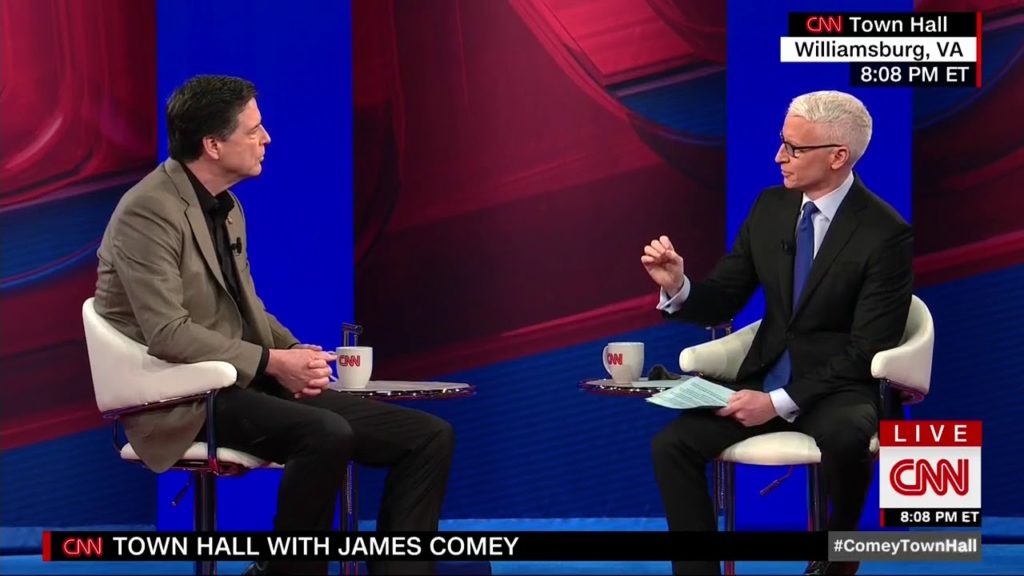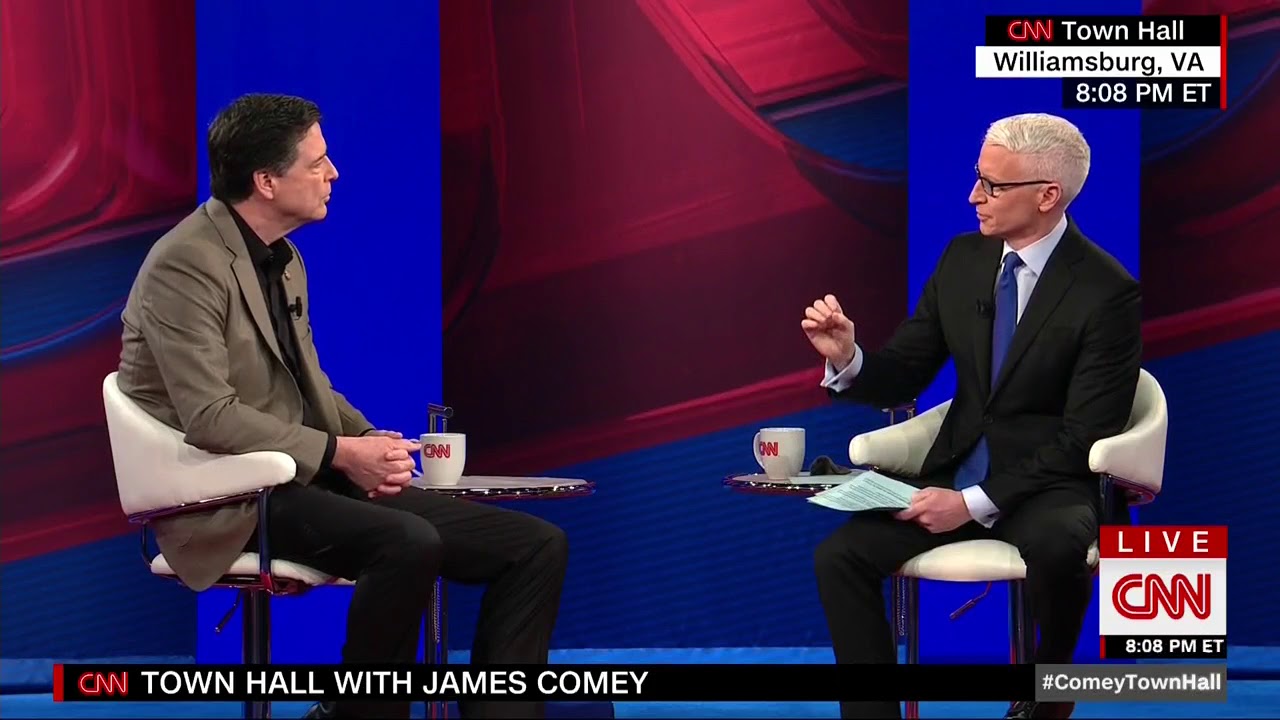Continuing my look at the interviews of James Comey on the release of his book, Higher Loyalty, Truth, Lies and Leadership.

By far, the most interesting Q&A came between the former FBI director and students from William and Mary College in a Town Hall format broadcast by CNN. This exchange offers more discussion covering the legality of the release of the former director’s memos.
EVELYN LAWHORN: Hi. My question was, do you think that there’s any credence to the president’s claims that you broke the law when you released your memos?
COMEY: I don’t. I hope that won’t surprise you–I don’t. In fact, I think he’s just making stuff up. The memos are actually two pieces- and the details matter because the facts matter and should matter even to the president. I sent one memo unclassified then, still unclassified and it’s recounted in my book, to my friend Dan Richman and asked him to get the substance of it but not the memo out to the media.
Separately, I wrote a bunch of memos about my interactions with President Trump and I was what was called an original-classification authority of the FBI, meaning I had the training and the authority to make decisions about what should be classified and what shouldn’t.
Some of those memos I decided should be classified. Four others, I wrote them and was highly confident they should not be classified. Those four-I kept a copy at the FBI and a copy in my personal safe at home.
After I was fired I put together a legal team with three people, one of whom was Professor Dan Richmond at Columbia University. After I had asked him to give this information to the media I separately gave my legal team four memos which were unclassified. They included the one that he had gotten to give the substance of it to give the New York Times.
The bottom line is, I see no credible claim by any serious person that that violated the law. Here’s a good thing though-the Department of Justice is all about accountability. The Department of Justice Inspector General has taken a look at not whether I mishandled classified information, because that’s frivolous, but whether I complied with policy as I should in making the memos and in the way, I stored them.
Anderson Cooper then asked an important follow-up.
COOPER: But as somebody who has the authority to classify documents, you know that stuff is sometimes retroactively classified, and I believe one of the documents was retroactively classified lowest-level classification, wasn’t it?
…So, if you’re releasing memos which may later on be classified which happened to-with Hillary Clinton as well, aren’t you taking a risk that you think you know this is not going to be classified but it turns out one of them was retroactively?
COMEY: I don’t think of it as a risk. You make an educated judgment based on your training and your experience as to what’s classified and what’s not.
COOPER: But you did leak-you did leak memos. Is it okay for somebody at the FBI to leak something-an internal document, even if it’s not classified? Isn’t that leaking?
COMEY: There’s a whole lot wrong with your question, Anderson. First, I didn’t leak memos. I asked a friend to communicate the substance of one unclassified memo.
COOPER: Whether you –
COMEY: Can I finish for a second? … One unclassified memo to the media and it was really important. I was a private citizen. I was not an FBI employee at that time.
COOPER: Right. But it was an internal document, and it was a document you had written while you were FBI director. That is a leak. If you tell somebody, don’t give them the document but tell them what’s in the document, that’s still a leak, no?
COMEY: Well, not to get tangled up in it, but I think of a leak as an unauthorized disclosure of classified information.
COOPER: Really? You did?
COMEY: That’s how I thought about it as FBI director; we investigated leaks. So, unauthorized disclosures.
COOPER: In your memo when you said- when the president said he was eager to find leakers and would like to nail one to the door as a message-
COMEY: I said that.
COOPER: Shouldn’t you be nailed to the door, then? I mean, aren’t you a leaker? You gave up a document that was released to the New York Times- information from that document released to the New York Times. I know you say, it’s not classified but plenty of people leak non-classified information to reporters and the White House and the FBI gets upset about it.
COMEY: The FBI gets upset when people make unauthorized disclosures of protected information. [There] was nothing protected about this. It wasn’t classified, it wasn’t privileged. It’s also in my book.
COOPER: So, when you were FBI director if somebody on your team had given-had given a friend documents that they were writing that you were involved with and said, oh, just tell the New York Times what’s in this document, you wouldn’t have had a problem with that?
COMEY: Well, depending on what was in the document.
COOPER: But even if it’s not classified?
COMEY: Was it protected information? Was it investigative information? Was it classified information? Was it grand-jury information?
COOPER: So, I guess I’m surprised that you only think leaks- officially, a leak is something that’s classified.
COMEY: The reason I hesitate is, that’s how I think about it as a lawyer and as a director of the FBI. In practice, the term gets applied to a broad range of things — I totally get it. I intentionally gave this information to a friend intending that it be out in the media. I wanted it to get in the media.
COOPER: Right.
COMEY: As a private citizen I could do that and did that just as I’ve written about it in my book.
One of the best questions asked of Comey concerned ethical leadership.
COMEY: I think effective leaders, to be effective in anything near the long term have to be ethical. And what I mean by ethical is, make decisions with an eye towards lasting values above the urgency of the quarterly earnings statement or individual feelings of political forces or the news. But look at the long term and care deeply about helping their people reach their potential and find meaning in the work. To me, that’s the only way to be effective as a leader to be an ethical leader. And one other thing I’ll say. To bring truth to the center of your enterprise, whether it’s a non-profit or company or the government, have truth at the center of it.
The truth about yourself and about the troubles that you’re dealing with. It’s the only way to be effective in the long — in the long run. Don’t believe that about President Trump. And the reason I say that is, ethical leaders have external reference points. When they’re making hard decisions, they draw on philosophy or religious tradition or logic or history. They draw on a set of norms and values that help them lift their eyes and figure out what the right decision is. As best I can tell, President Trump doesn’t have any external reference points. And it’s a hard thing to say but I believe it. His only reference point is internal.
Throughout all the interviews I watched, Comey remained clear, consistent and, particularly with the William and Mary students, went into a good bit of detail in explaining his decision-making process.
However, what all the interviews lack is context, and the former director’s book provides that missing context.
That’s up next, on Thursday.
Comments










